Can dogs eat nuts? A comprehensive guide for dog owners
Many dog owners wonder if nuts could be a healthy addition to their dog's diet. Nuts are a valuable source of nutrients for humans, but which nuts can dogs eat? The answer is complex, as not all nuts are the same and some can even be toxic to dogs.
In this article, you will learn which nuts you can feed your dog, which nuts are dangerous and what health risks nuts in general pose for dogs.

Nuts and Dogs: A General Overview
Nuts contain a variety of nutrients such as healthy fats, proteins and minerals that are extremely beneficial for humans. But dogs are different. While some nuts may be safe in small amounts, many other types pose significant risks. Some nuts can cause serious health problems ranging from digestive upset to fatal poisoning.
Unlike specially formulated dog food that is designed to meet the needs of dogs, nuts often contain too much fat and inappropriate ingredients that can put a strain on the sensitive digestive system of dogs. Therefore, nuts should never take on the role of dog food, which is specifically designed to provide a balanced and safe diet for dogs.
Which nuts are safe for dogs?
Some nuts are safe to feed to dogs in very small amounts as long as they are unsalted and unseasoned. However, these nuts should always be approached with caution as they too can cause problems if consumed in excess. Relatively safe nuts include:
peanuts – Allowed, but in moderation
Peanuts are one of the few nuts that dogs can tolerate in small quantities. They contain valuable proteins and healthy fats. However, make sure that you do not give your dog salted or roasted peanuts. Peanut butter without added sugar is also safe in small quantities and is popular with many dogs. Make sure that it does not contain xylitol, as this sweetener is highly toxic to dogs.
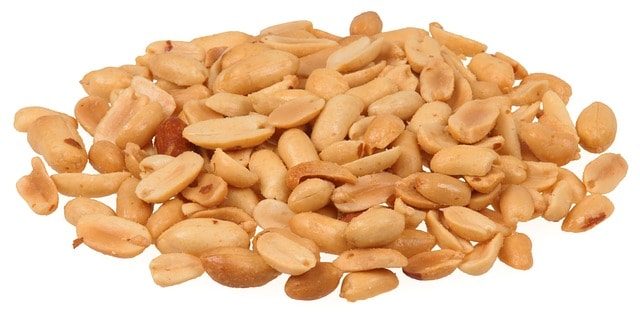
cashews – Okay in small quantities
Cashews are another type of nut that is safe for your dog in small amounts. They contain less fat than other nuts and are high in magnesium and potassium, making them a nutritious but high-calorie treat that should only be fed occasionally.
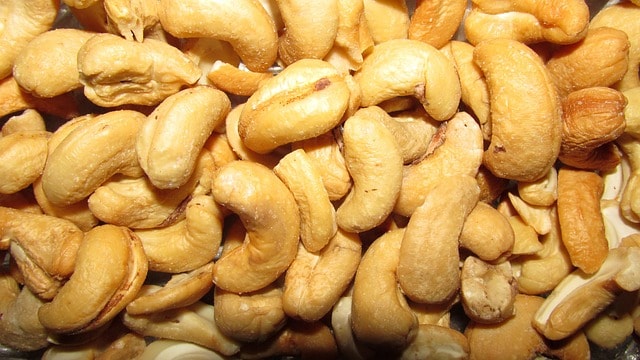
almonds – To be enjoyed with caution
Although almonds are not directly poisonous to dogs, their hard consistency can cause digestive problems and choking, especially in smaller dogs. They also contain a lot of fat, which can lead to diarrhea and vomiting if consumed in excess. It is best to leave almonds out of your dog's diet completely.
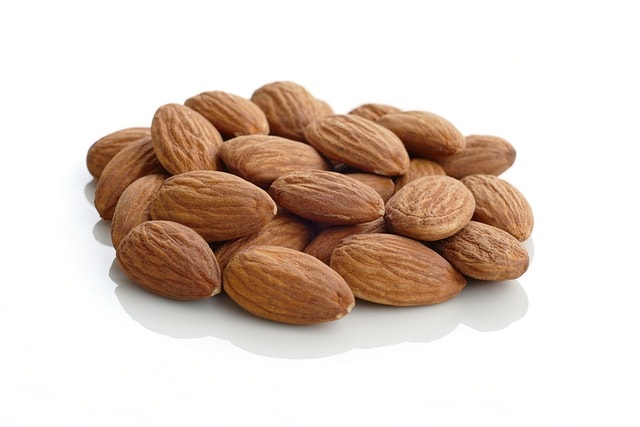
Which types of nuts are dangerous for dogs?
While some nuts may be safe for a dog in small amounts, there are certain nuts that dogs should never eat. These nuts can cause serious health problems and are often dangerous even in small amounts.
macadamia nuts – Highly toxic!
Macadamia nuts are one of the most dangerous nuts for dogs. Even a few nuts can cause severe symptoms such as vomiting, muscle weakness, tremors and even fever. Although the exact cause of macadamia nut toxicity in dogs is not fully understood, it is known that they can affect the nervous system and cause muscle damage. If your dog has eaten macadamia nuts, you should see a vet immediately.

walnuts – A no-go for dogs
Walnuts should also be strictly avoided. They can cause gastrointestinal problems and, when moldy, contain toxins that are extremely toxic to dogs. Moldy walnuts contain so-called mycotoxins, which can cause tremors, cramps and neurological disorders in dogs. Therefore, walnuts should never be put in your dog's food bowl.
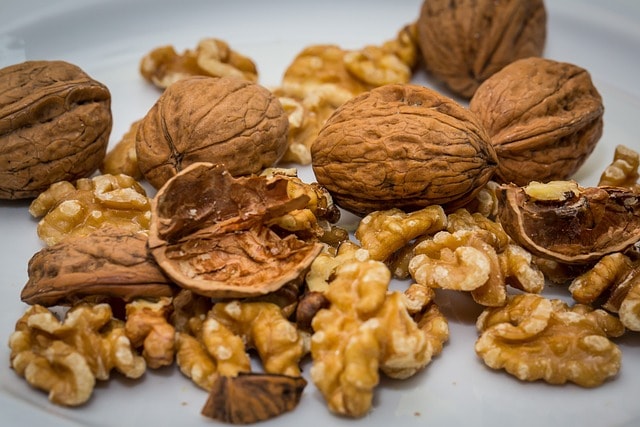
Can dogs eat hazelnuts?
Hazelnuts are a special case. Although they are not poisonous like macadamia or walnuts, they should still be avoided. The reason for this is that hazelnuts can easily cause intestinal blockages due to their hard consistency, especially in smaller dogs. In addition, like many other nuts, they contain a high fat content, which can lead to digestive problems and, in the worst case, pancreatitis (inflammation of the pancreas). In addition, some dogs can be allergic to hazelnuts, which can manifest itself in symptoms such as itching, skin rashes or difficulty breathing.
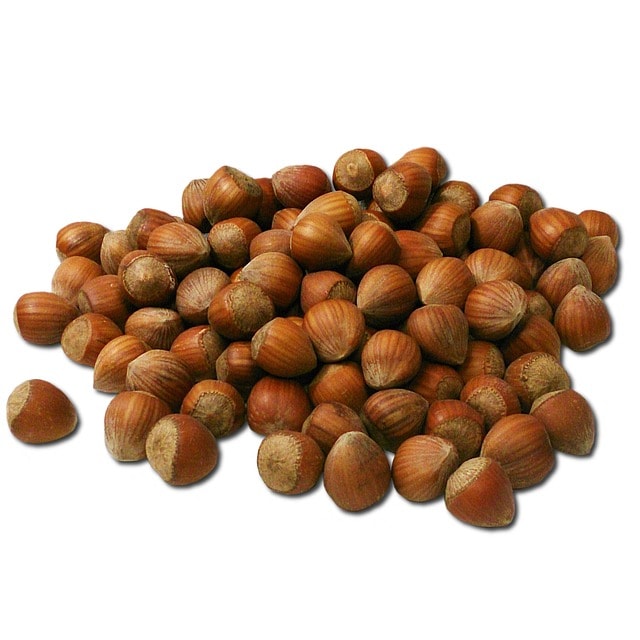
Why are nuts problematic?
Aside from the danger of poisonous nuts, even "safe" nuts pose some risks. Here are the most common problems:
High fat content
Nuts are extremely high in fat, which may be beneficial for humans but often causes problems for dogs. High fat content can cause vomiting, diarrhea and, in more severe cases, pancreatitis in dogs. Pancreatitis is a painful and potentially life-threatening condition that should be avoided at all costs.
risk of suffocation and intestinal obstruction
Many nuts have a hard, round shape that dogs can easily swallow. In smaller dogs in particular, this can lead to intestinal blockage, which can only be treated surgically. There is also a risk that your dog could choke on a nut, especially if he tends to devour his food quickly.
Spiced and salted nuts: doubly dangerous
Seasoned or salted nuts should never be fed to dogs. Salt can cause kidney problems, high blood pressure, and even salt poisoning in dogs. Spices such as onion or garlic powder, which are often found in seasoned nuts, are highly toxic to dogs.
What to do if your dog has eaten a poisonous nut?
If your dog accidentally eats a poisonous nut such as macadamia nuts or walnuts, you should act immediately. Here are the first steps:
-
Stay calm – Panic doesn’t help in this situation.
-
Observe symptoms – Watch for signs such as vomiting, tremors, muscle weakness or restlessness.
-
Contact your veterinarian – Do not hesitate to call or visit the veterinarian directly. Quick action can save lives.
-
attempt to induce vomiting – Some vets recommend inducing vomiting to remove the nut from the body as quickly as possible. However, you should only do this under veterinary supervision.
Conclusion: Should dogs eat nuts?
There is no general answer to the question "Can dogs eat nuts?", as it depends greatly on the type of nut. Some types of nuts, such as peanuts or cashews, can occasionally be fed in small quantities as treats, as long as they are unsalted and unseasoned. They provide proteins and healthy fats that can also be useful for dogs. However, they should definitely not become a permanent part of your dog's diet, as there is a risk of gastrointestinal problems or even more serious illnesses such as pancreatitis.
On the other hand, there are types of nuts that are absolutely taboo for dogs, such as macadamia nuts and walnuts. These nuts are not only difficult to digest, but can also cause serious health problems in dogs, from muscle cramps to vomiting and neurological problems. Macadamia nuts are even considered particularly poisonous and can cause serious poisoning even in small quantities.
Although hazelnuts are not directly poisonous, they should also be avoided as they can cause choking and digestive problems in dogs. The high fat content of many nuts also makes them problematic for dogs in general as it increases the risk of stomach upset, diarrhea or even more serious illnesses.
It is therefore important for dog owners to know exactly what types of nuts are and how they affect dogs. The safest decision is to completely eliminate nuts from your dog's diet and instead choose healthier alternatives such as fruit or special dog snacks. Treats such as carrots, apples or commercially available dog treats are not only safer, but also provide valuable nutrients without the health risks associated with nuts.
In summary: Even though some types of nuts may be safe for dogs in small quantities, the risk outweighs the benefit in most cases. The question "Can dogs eat nuts?" should therefore usually be answered with "no" in the interests of your dog's health. If in doubt, you should always consult a veterinarian before giving your dog a new food to ensure that it is suitable and safe for your dog and the dog diet.
